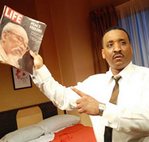SITE GUIDE
SEARCH
REVIEWS
REVIEW ARCHIVES
ADVERTISING AT CURTAINUP
FEATURES
NEWS
Etcetera and
Short Term Listings
LISTINGS
Broadway
Off-Broadway
NYC Restaurants
BOOKS and CDs
OTHER PLACES
Berkshires
London
California
New Jersey
DC
Connecticut
Philadelphia
Elsewhere
QUOTES
TKTS
PLAYWRIGHTS' ALBUMS
LETTERS TO EDITOR
FILM
LINKS
MISCELLANEOUS
Free Updates
Masthead
A CurtainUp Review
The Man in Room 306
|
Oooh, I know what the problem is! He's just trying to get me back from that time in Chicago when we were at that press conference. Yeah, he needed to use the john; kept squirming and cussing under his breath.— Dr. Martin Luther King Jr.
|

Craig Alan Edwards
|
Set in the Memphis hotel where King spent his last night before his assassination, this is a long monologue addressed to an invisible audience. Edwards as King reveals much that we already know: He was not exactly a faithful husband. He was under close FBI surveillance. He was wary of the Black Power movement, which in fact did eventually destroy and temporarily supplant his own.
But there is also much here that is original. According to Edwards, King needed pills to sleep, was a clandestine smoker, believed that pigeons had a special spiritual significance in his life and longed to be a baseball player or an opera singer. What's more, he had a difficult relationship with his father and at one time wanted to marry a white girl, a waitress who his friends thought was beneath him. And most amazing, lots of his books were ghost written.
If Edwards did any research for his show, surely he should tell his audience. If he didn't, what is the value of a show based on speculation? The lack of factual backup is in itself is disturbing, but even more so is the way in which Edwards chose to humanize his subject with traits such as the tendencey to bear petty grudges, vanity and the refusal to speak in front of small crowds.
King performs a sexy imitation of Marilyn Monroe singing her famous Happy Birthday song to John Kennedy. He recounts with glee a practical joke he played on the Reverend Abernathy. He stands on his head to get rid of hiccups. He takes great joy in potty humor. At one point Edwards has King imitate President Johnson, saying, "My fella Americans. We can't have thousands of those crazy Negroes — naw, naw he'd say niggers!" To have King imply thq5 President Johnson, the man who worked so hard to pass the massive civil rights legislation, would call African-Americans "niggers" is an insult to the memory of both men.
In between crude jokes, and moments of despair and panic, King is shown to display some concern for the people he is leading. But it is almost impossible to reconcile the childish whiner with the courageous leader Edwards would have us believe King was.
The last image we have of is Edwards on tape, delivering King's final address in which he says, "But oh my friends, I must confess to you tonight, that sometimes I get tired. Sometimes I get discouraged. But I am not concerned about that now. I just want to do God's will And he's allowed me to go up to the mountain." Is this a man who would say,"Late one night we were drinking beer and getting loud outside the barracks, when out of nowhere a bright light blinded us. From it emerged a policeman, flashlight in hand! Now we weren't arrested, but here was a report. And I knew if Daddy King saw it I'd better give my life to Jesus, cause my ass was gonna be his?"
It would have helped, perhaps, if Cheryl Katz, who directs Edwards, had put a damper on some of his excesses. As it is, she allows him to work against both himself and the man he portrays.
|
The Man in Room 306 Written and performed by Craig Alan Edwards Directed by Cheryl Katz Additional Voices: Calvin Grant, William J. Ward, Fredi Walker-Browne Set Design: Charlie Corcoran Lighting Design: Jill Nagle Sound Design: Andy Cohen Costume Design: Arthur Oliver Luna Stage at 59E59 Theaters Running Time: 65 minutes From 1/15/10; closing 2/14/10 Tues-Wed 7:15, Thurs-Fri 8:15, Sat 1:15 and 8:15, Sun 3:15 and 7:15 Ticket price: $35 ($24.50 for 59E59 Members) Reviewed by Paulanne Simmons |
|
REVIEW FEEDBACK Highlight one of the responses below and click "copy" or"CTRL+C"
Paste the highlighted text into the subject line (CTRL+ V): Feel free to add detailed comments in the body of the email. . .also the names and emails of any friends to whom you'd like us to forward a copy of this review. You can also contact us at Curtainup at Facebook , Curtainup at Twitter and at our Blog Annex |
|
Subscribe to our FREE email updates with a note from editor Elyse Sommer about additions to the website -- with main page hot links to the latest features posted at our numerous locations. To subscribe,
E-mail: esommer@curtainup.comesommer@curtainup.com
put SUBSCRIBE CURTAINUP EMAIL UPDATE in the subject line and your full name and email address in the body of the message -- if you can spare a minute, tell us how you came to CurtainUp and from what part of the country. |





